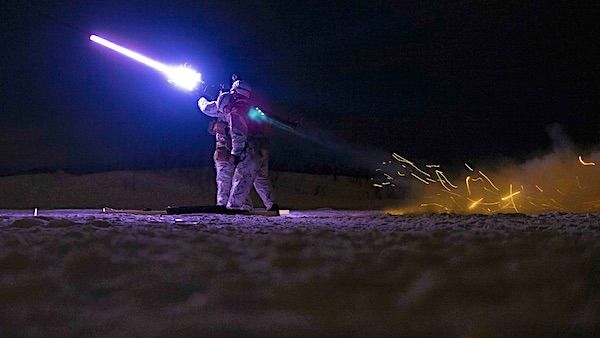‘Wokeness has gone too far’

U.S. Marine Corps Pfc. Triston Gryniewski, left, and Sgt. Colin Rowan fire a stinger-launch simulator during a live-fire range event at Setermoen, Norway, Thursday, Feb. 29, 2024, to prepare for Nordic Response. (U.S. Marine Corps photo by Lance Cpl. Orlanys Diaz Figueroa)
(Written by J.M. Phelps. Originally published here in WND, republished with permission.)
Across most branches of the U.S. military, recruitment numbers continue to plummet. As is widely known, lack of trust in senior military leadership as well as “woke” ideology now plague America’s armed forces. But the ultimate question remains: Can the U.S. still win wars?
To find out what the rank and file of the United States military believe in 2024 about fighting a major war against a near-peer threat, this writer conducted an informal survey, at random, of over 200 current members of the U.S. military.
When asked if the U.S. could win a war against a near-peer threat like China, Iran, North Korea or Russia, 188 of the survey’s 229 participants replied “No.”
WND interviewed one participant in the survey, on the condition of anonymity due to concern over reprisals. Emphasizing that his views don’t reflect those of the Department of Defense or Department of the Army, Sgt. First Class (SFC) Robbie Barnes (a pseudonym) admitted he is “not overly confident” the United States could win a war against a foreign adversary.
“There’s a good chance we could win, but it would come at a great cost,” he explained, referring to the loss of life in combat.
Ten to 15 years ago,” Barnes said, “we could have won any war in the world, but I’ve lost a great deal of confidence in our superiority in conflict over the last decade.” His change of faith can be attributed to well-known issues surrounding recruiting and retention.
“Recruiting numbers are down more than ever, and [service members] are leaving the military because they see the direction we’ve gone since the Obama administration,” he said. Progressive policies have repeatedly been blamed for the military’s recruiting shortfall.
Apart from dwindling personnel numbers, Barnes argued, “Many [service members] don’t have the same level of ability or aptitude in maintaining our equipment anymore.” In that regard, 74% of the survey’s participants said their units are not well enough equipped to go to war, and 72% also said their units are not sufficiently trained for actual combat deployment.
Dwindling trust in leadership
Although Barnes continues to serve in the Army, his career was negatively affected by the implementation of the now-rescinded 2021 COVID-19 vaccine mandate. For his religious objection to the vaccine, he was punished and the experience caused him to question his trust of senior military leadership.
“They have proven time and again that they aren’t willing to have the best interest of the soldiers at heart,” he lamented, adding that the Army is no longer a “people-first organization.” Instead, he said, “the Army will do what’s best for the Army and for the government before it will do what’s best for its soldiers.”

Paratroopers receive commands from a jumpmaster inside a C-130 Hercules over Son Tay Drop zone at Camp Rudder, Florida, Oct. 26, 2022. (U.S. Army photo by Staff Sgt. Daniel Lee)
Virtually all the survey’s participants agreed, as 227 out of 229 said they do not trust senior leaders of the Department of Defense to have their best interest in mind.
The Biden administration selected leaders he considers “very weak and spineless,” said Barnes, noting that they routinely refuse to push back against policies that are antithetical to the military. Such policies may help advance Diversity, Equity, and Inclusion (DEI) and LGBTQ+ agendas within the military work force, but do so to the detriment of America’s national security, he said.
For example, Barnes pointed out, “they’ve gone full bore on this transgender-gender fluidity craziness.” Rather than hiring or promoting based on merit, he said, the military seems more interested in hiring and promoting “people with behavioral health issues.”
“Wokeness,” he summarized, “has gone too far [in the military].”
Regarding his immediate leadership, SFC Barnes said he is thankful to have a commander and first sergeant who do, in fact, keep his best interests in mind. However, less than half – just 37% – of the survey’s participants agreed, with most participants not trusting their immediate leadership to have their best interests in mind.








